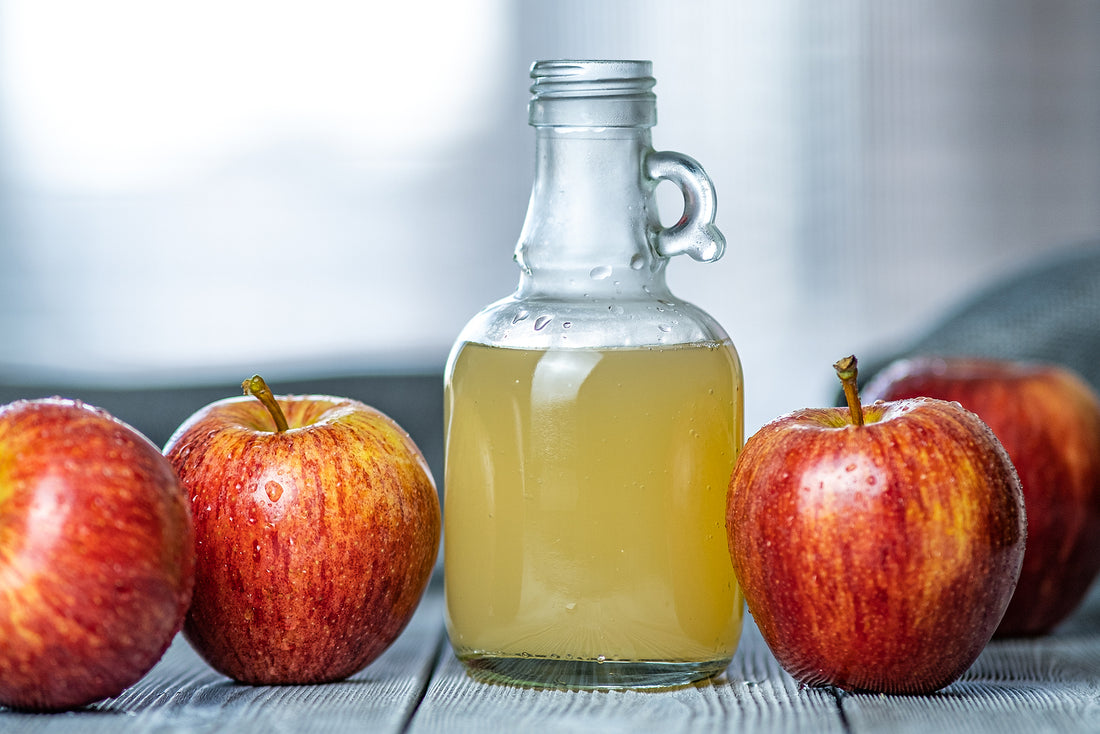Health supplements come in a variety of forms these days. Capsules, liquids, chews… there’s something for everyone.
You may be considering adding apple cider vinegar to your new healthy lifestyle. After all, you’ve heard it can help with lots of different things.
It’s true that it’s been used for centuries for both culinary and medicinal purposes. But is it all hype? Let’s see what the science has to say.
How It’s Made
Apple cider vinegar is made from chopped apples that are covered with water and left to sit at room temperature. After a few days, the apples begin to break down. Natural sugars from the apples start to ferment, and ethanol is formed. Soon after, bacteria begins to enter the scene and eat away at the sugars, converting the ethanol alcohol into acetic acid (1).
In raw, organic brands you may notice substance at the bottom or floating around near the top of the bottle. This is known as the “mother”, and is not harmful if you consume it.
Benefits
It’s easy for supplement companies to make big claims on how their products change lives. When it comes to apple cider vinegar, what does the science say?
According to different studies, the acetic acid is what makes apple cider vinegar so helpful to the body. Ingesting apple cider vinegar or applying it to the skin can help with:
- Blood pressure: Having chronic high blood pressure puts a lot of strain on your heart and blood vessels. It can lead to strokes, heart failure, metabolic issues and even dementia (2).
Studies suggest that the acetic acid found in apple cider vinegar can help keep blood pressure within normal ranges (3). This can help reduce your risks of developing heart disease down the road.
- Cholesterol: While heart disease has many factors, two of the biggest are chronic high blood pressure and elevated cholesterol levels.
Some animal studies showed that drinking apple cider vinegar can help lower cholesterol and triglyceride levels, by both blocking the storage of cholesterol and by increasing the output of bile acids through the digestive system (4).
- Antibacterial: Since ancient times, apple cider vinegar has been used for its antibacterial properties to help fight against infections and clean wounds (10).
It’s also been used to preserve food and prevent the growth of bacteria like E.coli, which leads to spoilage (11).
- Skin health: If you suffer from skin irritations like eczema, apple cider vinegar may help. Because the skin has a slightly acidic pH, the base properties of apple cider vinegar can help balance the pH. This can help improve the protective skin barrier and reduce sores (6).
Note: It’s important to remember to only apply diluted apple cider vinegar to the skin. Applying it undiluted may result in burns..
- Blood sugar: High blood sugars affect us all, especially if you’re diabetic. Research shows that drinking apple cider vinegar can help you regulate blood sugar and increase insulin sensitivity (8).
One study showed that those who consumed vinegar along with a high carb meal had an increased insulin sensitivity rate of between 19-34%, resulting in lower blood sugars and better insulin response (7).
- Weight loss: One of the most attractive benefits might be its ability to help you lose weight. Vinegar seems to have the ability to help you feel fuller, faster. It can help you eat less calories, which can greatly contribute to your success.
Several studies observed people who consumed apple cider vinegar and their weight. In one study, a group of 175 people drank between 1-2 tablespoons of it every day for three months. The average pounds lost were between 2-3 lbs (9). While this doesn’t seem like a lot, over time it can really add up.
How to Take It
Most people use apple cider vinegar when cooking. It can be added to recipes, drizzled on salads or mixed into a homemade mayonnaise.
Others prefer to drink it with water or another beverage. Standard doses can range between 1 teaspoon and 2 tablespoons.
Risks
Like all other vinegars, apple cider vinegar does have the potential to harm. Too much vinegar has been associated with:
- Eroding tooth enamel: Acidic foods and drinks have the potential to erode tooth enamel, although this applies more to frequent, heavy use.
- Slower food absorption rates: Some studies have observed that those who took 2 tablespoons of apple cider vinegar had a delayed emptying of the stomach over those who only drank water (5).
- Indigestion: If you have a sensitive stomach, drinking apple cider vinegar might cause nausea or upset stomach.
- Burns: Drinking or topically applying apple cider vinegar without dilution can result in throat, esophagus, or skin burns.
- Drug interactions: Certain diabetic medication, digoxin, or diuretics may react negatively with apple cider vinegar.
Always consult with your doctor to rule out any potential risks involving your use of apple cider vinegar.
Conclusion
Apple cider vinegar seems to offer a host of health benefits. The fermentation process produces acetic acid, which can help with health concerns such as cholesterol, blood sugars, weight loss, blood pressure, and some skin conditions.
While generally safe to take with water or other liquid, taking it straight can lead to problems. Talk with your doctor if you’re currently taking diabetic medication, certain diuretics, or digoxin. If you’re pregnant or nursing, proceed with caution.
Have you considered adding apple cider vinegar as part of your healthy lifestyle? Consider picking some up next time you visit your local health store.
References & Disclaimers
(1) https://medicalsciences.med.unsw.edu.au/news-events/2017/11/apple-cider-vinegar-really-wonder-food
(2) https://www.ncbi.nlm.nih.gov/pmc/articles/PMC3002634/
(3) https://pubmed.ncbi.nlm.nih.gov/11826965/
(4) https://pubmed.ncbi.nlm.nih.gov/16611381/
(5) https://pubmed.ncbi.nlm.nih.gov/18093343/
(6) https://www.ncbi.nlm.nih.gov/pmc/articles/PMC5125949/
(8) https://pubmed.ncbi.nlm.nih.gov/28292654/
(9) https://www.tandfonline.com/doi/pdf/10.1271/bbb.90231
(10) https://www.ncbi.nlm.nih.gov/pmc/articles/PMC5788933/
(11) https://pubmed.ncbi.nlm.nih.gov/27665528/
(12) https://pubmed.ncbi.nlm.nih.gov/27979138/
(13) https://www.ncbi.nlm.nih.gov/pmc/articles/PMC3431744/
✝✝This noted statement is based on independent research and is not necessarily the opinion of the author
